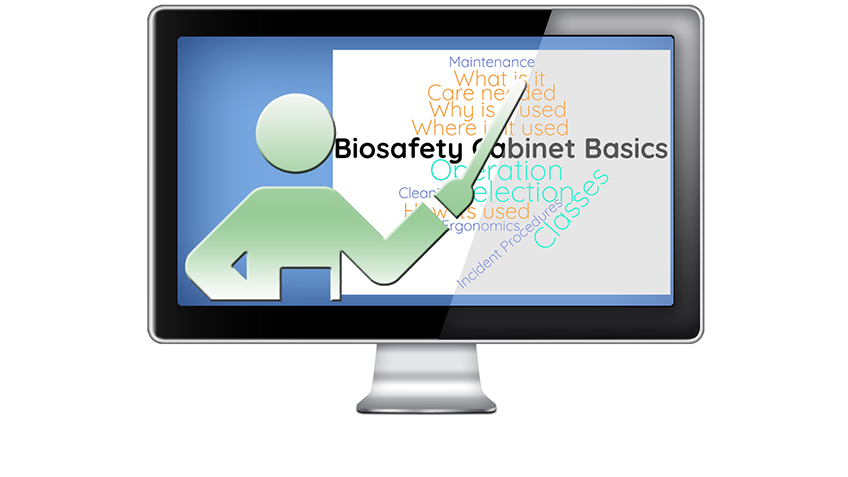Biosafety Cabinet Basics
A self-paced learning opportunity
Biosafety Cabinet Basics is an on-demand virtual course introducing the essential elements of use and selecting the correct cabinet. This course will first go over the typical applications that use biosafety cabinets (BSC). The course will then go over each class and type of cabinet and their basic function and airflow patterns. With the knowledge of how these BSC’s operate, the course will then cover work practices such as: ergonomics, emergency procedures, cleaning, and maintenance. At the end, the course will cover a few tips, tricks, and resources for users to reference.
OBJECTIVES
Upon completion of this webinar, participants will be able to:
- Verify work being performed in a BSC is appropriate
- Explain the basic operation of a BSC and why it is important
- Describe the different classes and types of BSC’s and what makes them unique
- Identify cleaning and maintenance needs of a BSC
- Describe best working practices within the BSC to eliminate contamination and containment loss
WHO SHOULD ENROLL
This course is designed for people who work in a laboratory or are entering the biosafety profession and those with up to three years of experience in biosafety or infection control. It is also suitable for people who will benefit from additional knowledge of the types of containment systems and how to choose appropriate cabinets for their workplace.
P.A.C.E.® CONTACT HOURS/CREDENTIALING MAINTENANCE POINTS
This course has been approved for 0.125 CM point toward RBP/CBSP recertification. ABSA International is approved as a provider of continuing education programs in the clinical laboratory sciences by the ASCLS P.A.C.E.® Program. This course is approved for 0.50 P.A.C.E.® contact hours. The links to the various invitations for the course will be unique to the user and cannot be shared. The links are for single, individual use only.
QUESTIONS
Please direct questions about this course to:
Kari DeServi, MEd, Director of Education, ABSA Office
(866) 425-1385 (toll free) | education@absa.org

The course is on-demand and can be viewed at the pace of the individual learner. Total video play time is approximately 30 minutes in length and total course completion time is approximately 60 minutes. Participants are required to complete the pre-course and post-course assessments and course evaluation to receive the completion certificate through the ABSA International Training Site. Access to the training site is unique to the user and cannot be shared. A list of resources and references will be provided. The forum feature for this course on the ABSA International Training Site allows the learner to ask questions or have a conversation with other participants or subject matter experts. Participants will have three (3) months to complete the on-demand course.
COURSE FEES
ABSA Members: $20
Nonmembers: $70
To obtain the ABSA member rate, the participant will need to be an ABSA member in the year in which the training is taken. Course fees include: course handouts, access to the ABSA International Training Site, and access to a forum feature for asking questions.
You will be sent detailed information regarding the course within 10 business days of purchase.
- Access to the module will expire 100 days (~3 months) after enrollment into the course on the ABSA International On-demand Training Site. An extension of three (3) additional months can be purchased for $30 prior to the expiration date of the module. The regular course fee will be applicable after the expiration date.
- Only two extensions will be allowed. After a total of 9 months, the regular course fee will apply.
- Once the module certificate has been issued, the participant will continue to have access to the module until the expiration date.
- Participants are encouraged to print out materials prior to completing the module to have materials for review post expiration date.
- The modules are FOR INDIVIDUAL USE ONLY. Access to the module and survey is based on individual email addresses.


